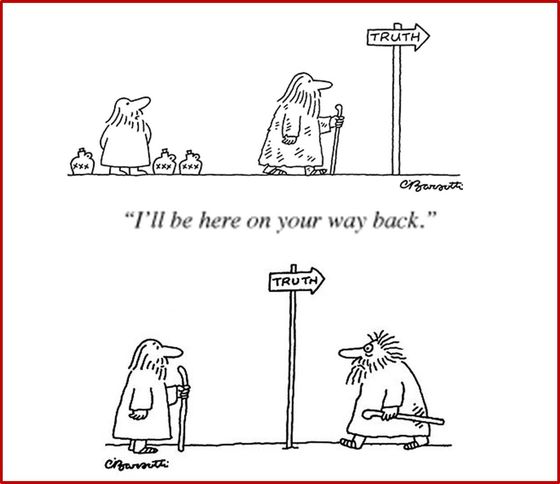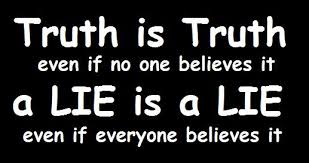Resources
"Empowerment isn't a buzzword among leadership gurus. It's a proven technique where leaders give their teams the appropriate training, tools, resources, and guidance to succeed."
John Rampton
This section complements our web page on Fighting Fake
and provides details of websites, blogs, articles and teaching resources that are concerned with exposing fake, seeking the truth, and improving the quality of public information. [1] A separate page identifies recent publications
on 'fake news', social media and the internet (and the dark web, information warfare and fighting fake). It contains the following sections:
1 Definitions & Origin of Terms
We are always keen to hear from anyone who can help improve this public resource — and preferably by reducing
the number of items / links rather than increasing them!
This Page is being reworked to make the information more accessible. The original section dealing with articles, books and guides has temporarly been moved to the bottom of the page.
1 Definitions & Origin of Terms
According to Collins, the word ‘fake’ was originally used as part of the slang spoken among criminals who wanted to conceal their activities from prying ears — it started out as a verb, and referred to producing a counterfeit or doctored version of something, such as money or documents. The term possibly originated from the Italian verb facciare ‘to make’.
The association of ‘fake’ with ‘news’ appears to have started out in the field of comedy, in shows such as Jon Stewart’s 'The Daily Show', but around 2005 the term began to be applied to false news stories that were circulated with malicious intent rather than as satire. It shot to prominence during the 2016 US presidential campaign when pundits noted the large number of websites broadcasting false stories under the guise of 'news'.
In November 2017 Collins
made ‘fake news’ its ‘Word of the Year’. It defined the term as: “false, often sensational, information disseminated under the guise of news reporting.” This followed Oxford Dictionaries
selecting ‘post-truth’ as its Word for 2016. It defined 'post-truth' as “relating to or denoting circumstances in which objective facts are less influential in shaping public opinion than appeals to emotion and personal belief.”
The term 'post-truth' seems to have been first coined bySteve Tesichin a 1992 essay in The Nation
magazine.
Words of the Year

You get an indication of the prevalence of ‘fake news’ and misinformation from the words chosen by the major dictionaries to represent recent years — at least in English! The other chosen words paint a pretty bleak picture of the public mood.
2 The Evolution of the Internet
a) Timeline
The timeline
below identifies some of the main hardware and software developments that have brought us the internet and social media.

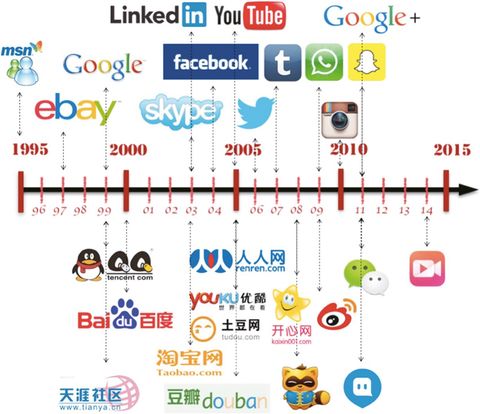
The graph to the left shows how the social media landscape has developed in China; the one below
divides the web's development into nine 'epochs'.
b) Number & Distribution of Internet Users
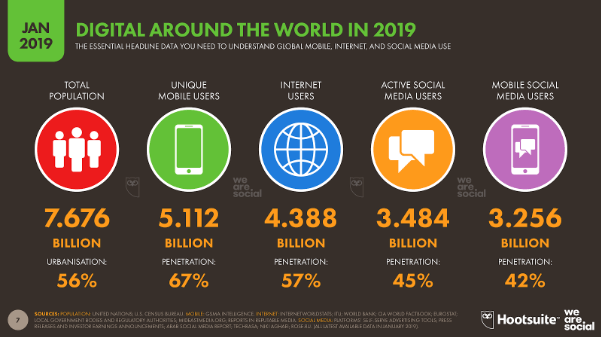
c) What Happens in a Minute?
To understand the challenge of controlling what appears on the internet / social media platforms, it is important to aware of the sheer volume of material that is being uploaded. Here's what happens in a typical minute:
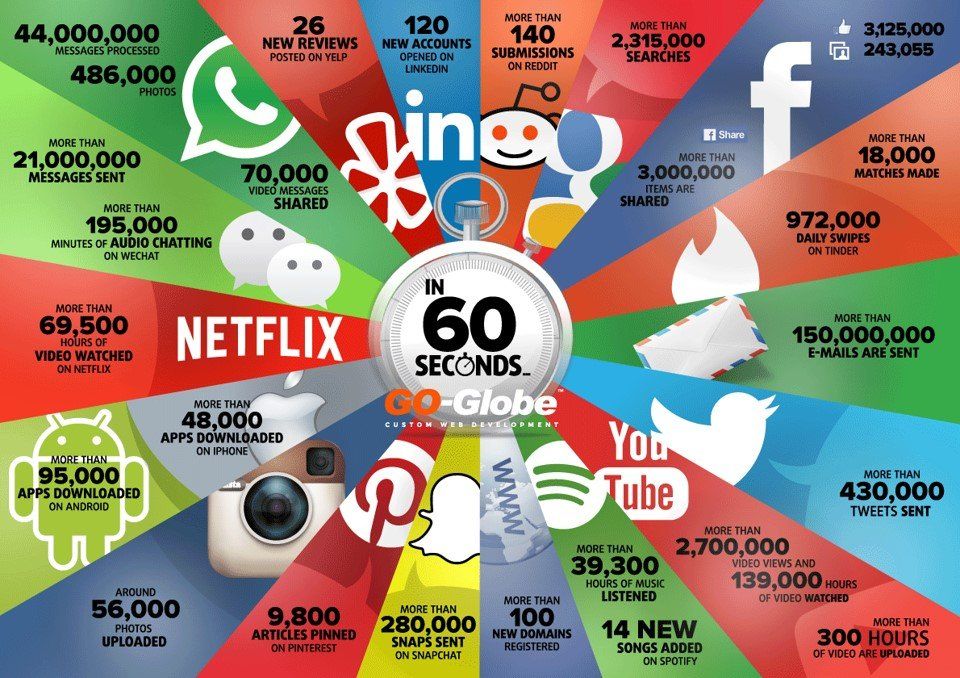
This graphic is from Visually.
3 Why Bad Stuff Happens on Line
In 'The World Wide Villain' — part of a series on BBC Radio 4
aired in Aug 2017 under the title 'Aleks in Wonderland: the Story of the internet' — Aleks Krotoski explains why there is so much bad stuff on the internet:
“We are dealing with non-standardised, complex systems all connected to a single giant super highway; a superhighway that is not checking to see who’s travelling on it, because, well, it was built that way. It’s a heady mix, technology and human behaviour… [So] why does bad stuff happen on line? because the net is a reflection of wider society. It’s an amplification of pre-internet human culture, drive and behaviour. That’s why there’s so much porn and gambling on line. That’s why fake news exists. That’s why we live in echo chambers. That’s why it’s used for propaganda; it’s used for bulling; and it’s used to con innocent people. The internet didn’t invent these things, it just made them much, much easier to find. The web has long been described as a great democratiser that gives everyone a free and open publishing platform to share whatever they want with everyone that wants to see it. Thank you Sir Tim Berners Lee.”
Sir Tim has grown increasingly concerned about what has happened to his world wide web: in Nov 2018 he launched a global campaign to “save the web from the destructive effects of abuse and discrimination, political manipulation, and other threats that plague the online world.” Humanity, he said, is “functioning in a dystopian way.” [2]
In March 2019 (on the 30th Anniversary of the WWW) Sir Tim identified three issues that are harming the web:
- malicious activity such as hacking and harassment;
- problematic system design such as business models that reward clickbait;
- unintended consequences, such as aggressive or polarised discussions.
You can read more about his Foundation, For the Web, here.
Unfortunately, tackling these problems is highly problematic, and especially when it comes to debunking myths and misinformation:
“Unless great care is taken, any effort to debunk misinformation can inadvertently reinforce the very myths one seeks to correct. To avoid these 'backfire effects', an effective debunking requires three major elements. First, the refutation must focus on core facts rather than the myth to avoid the misinformation becoming more familiar. Second, any mention of a myth should be preceded by explicit warnings to notify the reader that the upcoming information is false. Finally, the refutation should include an alternative explanation that accounts for important qualities in the original misinformation” [Cook et al]
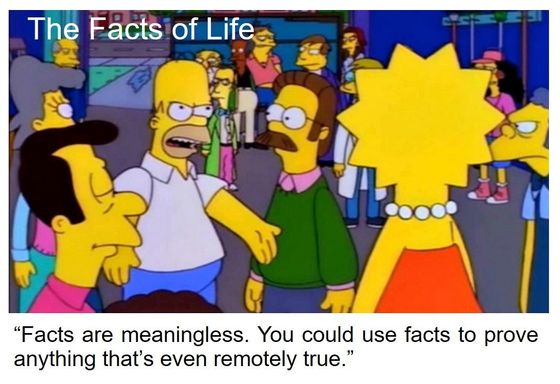
4 Resources for Teachers
You can find useful teaching resources about the some of the above subjects on the following sites — we hope to add more sites shortly:
a) Help your students spot false news [BBC]
This is "a collection of resources from around the BBC to help your students spot fake news and false information. This content explores the social, political and economic impact of news reporting, and the skills needed to analyse and critically evaluate information across a range of media." Access the resources here.
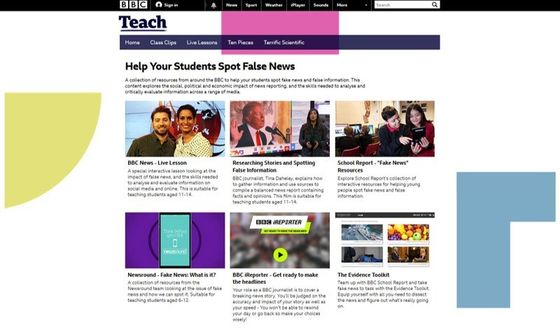
b) Be Internet Awesome [Google]
Google
announced in June (2019) that it was expanding its digital safety and citizenship curriculum for children, 'Be Internet Awesome,' to now include media literacy — specifically, the ability to identify so-called 'fake news' and other false content.
"The company is launching six new media literacy activities for the curriculum that will help teach kids things like how to avoid a phishing attack, what bots are, how to verify that information is credible, how to evaluate sources, how to identify disinformation online, spot fake URLs, and more." The courses offer kids not only instruction, but also a combination of activities and discussion starters aimed at helping them develop critical thinking skills when it comes to pursuing online resources. Access suite here.
c) The Day ─ 'News to Open Minds'
The Day
is a small, independent media company providing daily news to nearly a million subscribers, mostly teenagers. It carries no advertising and no commercial messages. "We help hundreds of thousands of young people from many different backgrounds form the regular habit of spending a few moments making the connection between the world of school and the wider world around them.Like a certain famous chef who has campaigned for healthy food in schools, we campaign for clear and balanced knowledge of the world: an ‘apple a day’ for the mind."
Read more about The Day here.
d) Philosophy & Critical Thinking
•
Julian Baggini [2002]: Making Sense (Oxford)
• Imogen Evans et al [2011]: Testing Treatments: Better Research for Better Healthcare (2nd Ed)
• Stephen Law [2006]: The Philosophy Files (Dolphin)
• Hy Ruchlis [1991]: How do you know it’s true? — discovering the difference between science & superstition (Prometheus Books)
• Jeremy Weate [1998]: A Young Person’s Guide to Philosophy (Dorling Kindersley)
• Imogen Evans et al [2011]: Testing Treatments: Better Research for Better Healthcare (2nd Ed)
• Stephen Law [2006]: The Philosophy Files (Dolphin)
• Hy Ruchlis [1991]: How do you know it’s true? — discovering the difference between science & superstition (Prometheus Books)
• Jeremy Weate [1998]: A Young Person’s Guide to Philosophy (Dorling Kindersley)
You might also like to take a look at Wikipedia's List of Fallacies
(reasoning that is incorrect and undermines the logical validity of the argument).
Logical Fallacies & Personal Biases
A logical fallacy is a flaw in reasoning. Logical fallacies are like tricks or illusions of thought, and they're often very sneakily used by politicians and the media to fool people. This useful website
has been designed to help you identify and call out dodgy logic wherever it may raise its ugly, incoherent head. A companion website
has been designed to help you explore cognitive biases and identify some of the most common biases that may be affecting your thinking.
e) Other Useful Websites for Teachers
•
Gapminder
•
Factcheckingday
Frontiers for Young Minds
provides access to scientific articles by distinguished scientists that are shaped for younger audiences by the input of their own young peers.
The 'Pacific Northwest Tree Octopus' website is one of a number of fake websites assembled by Phil Bradley
for use by librarians and educators who want to illustrate to students that things on the net are not always what they seem. His page provides examples of "websites that are full of lies, inaccuracies or false information — either for amusement or for more worrying reasons."
Please Note: this section is still being developed...
5 Fake News Debunked
The ‘EU versus Disinformation’ campaign (EUvsDisinfo) is run by the European External Action Service East Stratcom Task Force. The team was set up in Mar 2015 after the EU Heads of State and Government stressed the need to challenge Russia’s ongoing disinformation campaigns.
EUvsDisinfo
produces a weekly 'Disinformation Review' through which it have identifies and compiles a database of stories — as of mid 2019, almost 6,000 disinformation cases. They are publicly available here.
The campaigner notes that although it lists the outlets where the false stories have appeared, it does "not necessarily imply that the outlet concerned is linked to the Kremlin or pro-Kremlin, or that it has intentionally sought to disinform."
It says it "analyses messages, not the messenger. If the message is a) false, which is determined by the facts and b) originating and in line with identified pro-Kremlin disinformation messaging, it is included."
The database is searchable; and the information is supplemented by comment and analysis.
6 Useful Blogs
a) Bad & Improbable Science
• Bad Science
(Ben Goldacre)
• DenialismBlog
('don’t confuse
denialism with debate')
• DC Improbable Science
(David Colquhoun)
• Bad Science Debunked
(Mark Alsip)b) Self-delusion & Truth
c) Other Fakery
7 Our Contribution to the Debate
This section contains some materials that we have produced over the years, much of it written from a humanist perspective —for anyone who might be interested we have also included some basic information on Humanism...
a) Truth
“The truth may be puzzling. It may take some work to grapple with. It may be counter-intuitive. It may contradict deeply held prejudices. It may not be consonant with what we desperately want to be true. But our preferences do not determine what's true.” Carl Sagan
We consider a statement to be ‘true’ when it conforms to our understanding of reality, in other words it matches up with the way we see the world, and facts or statements can be verified beyond reasonable doubt. This is ‘observed truth’, and what we most commonly mean when we say something is ‘true’. ‘Scientific’ and ‘mathematical’ truth are special kinds of objective truth, where every care is taken to eliminate bias on the part of the observer.
Subjective truth is a rather different animal: it is private and personal and includes belief — constructs that are held to be true but which may not be justified or supported by factual evidence. Within this category we have: ‘moral truth’, ‘sacred truth’, and ‘emotional truth’.
For further analysis see:
•
[2017]: 'What is True?'•
[2017]: 'What's True Anymore?'
b) Information Manipulation & Post-Fact Politics
"Information is the oxygen of the modern age. It seeps through the walls topped by barbed wire, it wafts across the electrified borders." Ronald Reagan
• 'Bad Information'
[2015]
• 'Is Fake Information Destroying Democracy?' Ethical Record
July-Sept [2018]
c) Humanism, Culture & Values
"Humanism involves far more than the negation of supernaturalism. It requires an affirmative philosophy…translated into a life devoted to one's own improvement and the service of all mankind." Corliss Lamont
• 'On Values' [2003]
• 'A Humanist Perspective on AI' [2019]
• 'What it means to be a Humanist'
[2016]
• 'Humanism: an 'insane form of thinking?'
[2016]• 'On Values' [2003]
For a more comprehensive reading list on humanism (for all ages) see the books listed below, which are summarised in note [4].
8 Need an Expert?
If you are looking for an expert on on misinformation and or information warfare, there are two places you might like to start:
a) Global Experts on Debunking of Misinformation
The Global Experts on Debunking of Misinformation
portal provides contact details of a global network of over 80 academics/researchers from across multiple disciplines who are experts on misinformation, including:
• Social media and internet
• Debunking of misinformation
• Conspiracy theories and lack of trust
• Science communication and science denial
The website notes that its experts welcome inquiries from media, government and or NGOs. The database can be searched by institution and key words.
• Debunking of misinformation
• Conspiracy theories and lack of trust
• Science communication and science denial
b) DisinfoPortal.org
The second portalwas launched in June 2018 by the Atlantic Council. It provides a database of country-specific researchers and organizations “who are willing to answer media inquiries and questions from government officials and other experts on disinformation threats posed by state and non-state actors.”
The site is described as a “one-stop interactive online portal and guide to the Kremlin’s information war which aggregates open source research and journalism from the United States and Europe."
OLD MATERIAL on Articles, Books & Guides
This section is currently being reworked...
a) Truth, Lying & Deception
•
Julian Baggini [2017]; 'A Short History of Truth: Consolations for a Post-Truth World', Quercus Publishing
•
Robert Hutton [2014]: ‘Would They Lie to You? How to spin friends and manipulate people’, Elliott & Thompson
•
Michiko Kakutani [2018]: 'The Death of Truth: Notes on Falsehood in the Age of Trump', Harper Collins
•
Peter Oborne [2005]: ‘The Rise of Political Lying’, Simon & Schuster UK
• Robert Trivers [2011]: ‘Deceit and Self-Deception: fooling yourself the better to fool others’, Allen Lane
• Bernard Williams [2002]: ‘Truth and Truthfulness: An essay in genealogy’, Princeton University Press
• Bernard Williams [2002]: ‘Truth and Truthfulness: An essay in genealogy’, Princeton University Press
See also Section 3 below, which includes material we have prepared on the meaning of truth.We've also included a separate page
which explores some of the techniques ad agencies and internet companies use to grab our attention and keep us scrolling through their websites.
b) Denialism & Conspiracy Theory
•
David Aaronovitch [2009]: ‘Voodoo Histories: The role of conspiracy theories’, Jonathan Cape
•
Rob Brotherton [2015]: ‘Suspicious Minds: Why we believe conspiracy theories’, Bloomsbury Publishing
•
Karen Douglas, Robbie Sutton & Aleksandra Cichocka [2017]: 'The psychology of conspiracy theories', Current Directions In Psychological Science
• Keith Kahn-Harris [2018]: 'Denial: the unspeakable truth', Notting Hill Editions
• Michael Specter [2010]: 'Denialism: How irrational thinking harms the planet and threatens our lives', Duckworth Overlook
• Michael Specter [2010]: 'Denialism: How irrational thinking harms the planet and threatens our lives', Duckworth Overlook
c) Scientific Misconduct& Fraud
Scientific misconduct is the violation of the standard codes of scholarly conduct and ethical behavior in the publication of professional scientific research (see Wikipedia for more information on this — who should be held responsible, the impact on science, etc.).
•
Stephen Buranyi [2017] 'The Hi-tech War on Science Fraud' The Guardian
•
Enago Academy [2018]: 'Ten Types of Scientific Misconduct'
•
The Lancet [1999]: 'The COPE Report: Coping with Fraud'.
The Canadian journal 'The Scientist' regularly publishes articles on scientific misconduct.
d) Online Information & Social Media
•
Lydia Harriss & Katie Raymer [201]: 'Online information and fake news,' POSTnote 559, Parliamentary Office of Science and Technology. London, UK: House of Parliament.
•
Sander van der Linden [2017]: 'Beating the Hell Out of Fake News,' Ethical Record, October-November-December 2017, Vol.122 No.6]
• Timothy Garton Ash [2017]: 'Answer to populist politics and fake news might lie in public service media', The Straits TimesYou will find videos exploring the issue of online information and social media on the Videos Page.
e) Big Data & the Health of the Internet
•
Andrew Keen [2015]: 'The Internet is not the Answer', Atlantic Books
• Aleks Krotoski [2013]: 'Untangling the Web: What the internet is doing to you', Faber & Faber
• Solana Larsen (Ed.) [2017] 'Internet Health Report', Mozilla
• Edward Lucas [2015] 'Cyberphobia: Identity, Trust, Security and the Internet,' Bloomsbury Publishing
• Viktor Mayer-Schonberger & Kenneth Cukier [2013] 'Big Data: A revolution that will transform how we live, work and think', John Murray Publishers
• Aleks Krotoski [2013]: 'Untangling the Web: What the internet is doing to you', Faber & Faber
• Solana Larsen (Ed.) [2017] 'Internet Health Report', Mozilla
• Edward Lucas [2015] 'Cyberphobia: Identity, Trust, Security and the Internet,' Bloomsbury Publishing
• Viktor Mayer-Schonberger & Kenneth Cukier [2013] 'Big Data: A revolution that will transform how we live, work and think', John Murray Publishers
f) Fake News & Bullsh*t
•
Liliana Bounegru et al [2017] 'Field Guide to Fake News,' First Draft News
•
John Cook & Stephan Lewandowsky [2011] 'The Debunking Handbook,' University of Queensland, Australia
•
Harry Frankfurt [2005]: 'On Bullshit', Princeton University Press
•
Stephen Law [2011]: 'Believing Bullshit: how not to get sucked into an intellectual blackhole', Prometheus Books
•
Claire Wardle (2017):'Fake news. It’s complicated.' First Draft News
(16 February 2017)
g) Post Fact / Truth
•
James Ball (2017):'Post-Truth: How Bullshit Conquered the World', Biteback Publishing
• Matthew D'Ancona [2017] ‘Post-Truth: The New War on Truth and How to Fight Back,’ Ebury Press
• Evan Davis (2017): 'Post-Truth: Why We Have Reached Peak Bullshit', Little, Brown
• Peter Pomerantsev [2015]: ‘Nothing is True and Everything is Possible’, Faber & Faber
• Matthew D'Ancona [2017] ‘Post-Truth: The New War on Truth and How to Fight Back,’ Ebury Press
• Evan Davis (2017): 'Post-Truth: Why We Have Reached Peak Bullshit', Little, Brown
• Peter Pomerantsev [2015]: ‘Nothing is True and Everything is Possible’, Faber & Faber
Here's a selection of the titles we are hoping to evaluate (and many more are shown at the bottom of the page — and there are more...) They deal with 'post truth', 'information warfare' and 'the dark web'. They are not listed in any order.
Scottish poet, Elvis McGonagall has recently written a wonderful poem
entitled 'Gimme Some Truthiness'for a 'A Brief History of Truth' [BBC Radio 4, 22 July 2017].
h) The Collapse in Trust / Age of Anger
•
EBU [2018]: 'Trust in Media 2018', European Broadcasting Union
•
Richard Edelman [2017]: ‘An Implosion of Trust’, The 2018 Edelman Trust Barometer
•
Andrew Harrison [2017]: 'Can you trust the mainstream media? The Guardian
(9 August)
• Pankaj Mishra [2017]: 'Age of Anger: a history of the present' Allen Lane
i) Information Warfare & Cyber Security
“A new type of war has emerged, in which armed warfare has given up its decisive place in the achievement of the military and political objectives of war to another kind of warfare - information warfare.”
V. Kvachkov [Russia’s Special Purpose Forces]
•
Christopher Paul & Miriam Matthews [2016]: 'The Russian ‘Firehose of Falsehood’ Propaganda Model' RAND Corporation [2]
• Keir Giles [2016]: 'Handbook of Russian Information Warfare', NATO Defense College (Fellowship Monograph No.9) [3]• Andrew Weisburd, Clint Watts & JM Berger [2016]: 'Trolling for Trump: How Russia Is Trying to Destroy Our Democracy' War on the Rocks
• Keir Giles [2016]: 'Handbook of Russian Information Warfare', NATO Defense College (Fellowship Monograph No.9) [3]• Andrew Weisburd, Clint Watts & JM Berger [2016]: 'Trolling for Trump: How Russia Is Trying to Destroy Our Democracy' War on the Rocks
j) Other Publications
Here are more titles we are hoping to evaluate in time: they deal with 'lies & dishonesty', 'post truth', 'information warfare' and 'the dark webb':
•
Daniel J. L evitin [2017]: 'Weaponized Lies: How to Think Critically in the Post-Truth Era', Dutton Books [previously published as 'A Field Guide to Lies']
• Adam Macqueen [2017]: 'The Lies of the Land: A Brief History of Political Dishonesty,' Atlantic
• Craig Silverman (Ed) [2017] 'Verification Handbook: an ultimate guideline on digital age sourcing for emergency coverage'
• Siva Vaidhyanathan [2017]: 'Anti-Social Network' (a book about Facebook due out later this year).
• Adam Macqueen [2017]: 'The Lies of the Land: A Brief History of Political Dishonesty,' Atlantic
• Craig Silverman (Ed) [2017] 'Verification Handbook: an ultimate guideline on digital age sourcing for emergency coverage'
• Siva Vaidhyanathan [2017]: 'Anti-Social Network' (a book about Facebook due out later this year).
If anyone would like to comment on any of these publications to help with this assessment we'd really appreciate it. Many thanks!
Notes
1 Please note that with respect to website links, we have a simple rule — no more than 10 references per topic (and preferrably 5). If you'd like to suggest an article or website for inclusion, please let us know which of the other papers you think we should replace. (We can't guarantee to accept your suggestions, but we will consider them.) Also, we do not necessarily endorse what is written in these linked sites . Readers should use their own judgement — please let us know if you think any of the material is inappropriate. Thank you!
2 Sir Tim is not alone: other leading internet pioneers have expressed concern at the way the web is being used today to spread untruths and peddle hate. These include Vint Cerf (‘father of the internet’), Steve Wozniak (Apple’s co-founder) & Jaron Lanier (virtual reality pioneer/guru).
2 Sir Tim is not alone: other leading internet pioneers have expressed concern at the way the web is being used today to spread untruths and peddle hate. These include Vint Cerf (‘father of the internet’), Steve Wozniak (Apple’s co-founder) & Jaron Lanier (virtual reality pioneer/guru).
3 According to David McRaney "The central theme of You Are Not So Smart is that you are unaware of how unaware you are. There is an old-and-still-growing body of research across several disciplines with findings that suggest you have little idea why you act or think the way you do. Despite this, you continue to create narratives to explain your own feelings, thoughts, and behaviors, and these narratives – no matter how inaccurate – become the story of your life. You Are Not So Smart is a fun exploration of the ways you and everyone else tends to develop an undeserved confidence in human perception, motivation, and behavior." He goes on: "I hope by reading it and listening to the podcast you’ll rediscover a humility and reconnect with the stumbling, fumbling community of man trying to make sense of things the best we can."
4
Humanists UK
provides he following comment on the philosophy books: BAGGINI: The editor of The Philosophers’ Magazine explores the “philosophy behind the headlines”, examining news stories for the philosophical issues they throw up: the problem of knowledge; ethics and privacy; the morality of war; faith and reason, and so on. Clearly written for the general reader, this would be an excellent Citizenship and General Studies resource for teachers and Sixth Formers . LAW: An excellent introduction to philosophy for children (top KS2 upwards) presents all the important questions in an easy to read and entertaining way that should get readers excited about ideas and thinking critically. Cartoons, visitors from outer space, arguments between friends written in everyday language, all help to make the big ideas accessible – Is there a God? Where do right and wrong come from? How do you know your parents really exist? Should you eat meat? RUCHLIS: This is a book which will encourage critical thinking and a respect for empirical science in 11-14 year olds by introducing them to the fundamentals of astronomy, probability theory and statistics. WEATE: An excellent introduction to some of the big questions through the ideas of famous philosophers, presented in a clear, chatty style. Not at all intimidating, useful for a wide age range.
5 The image is from the RAND Corporation report.
6 If you think the debate over fake news and misinformation has been blown out of proportion, read this report.
6 If you think the debate over fake news and misinformation has been blown out of proportion, read this report.


